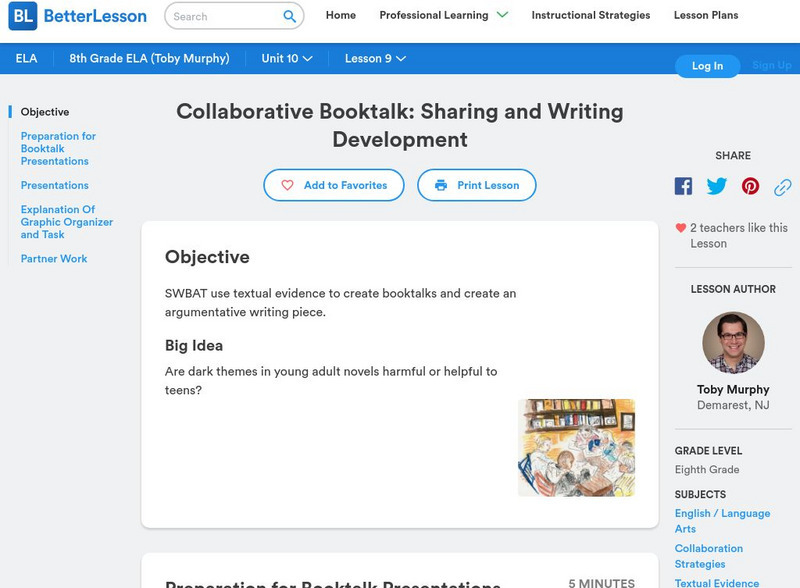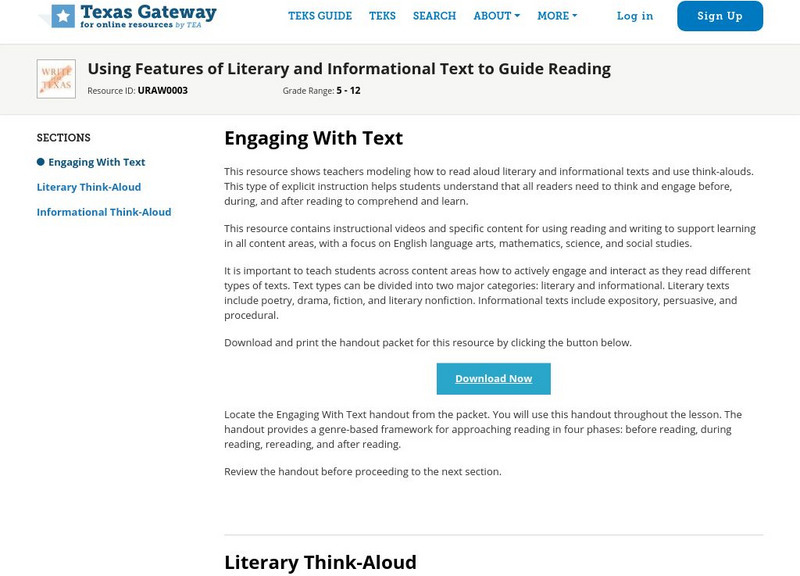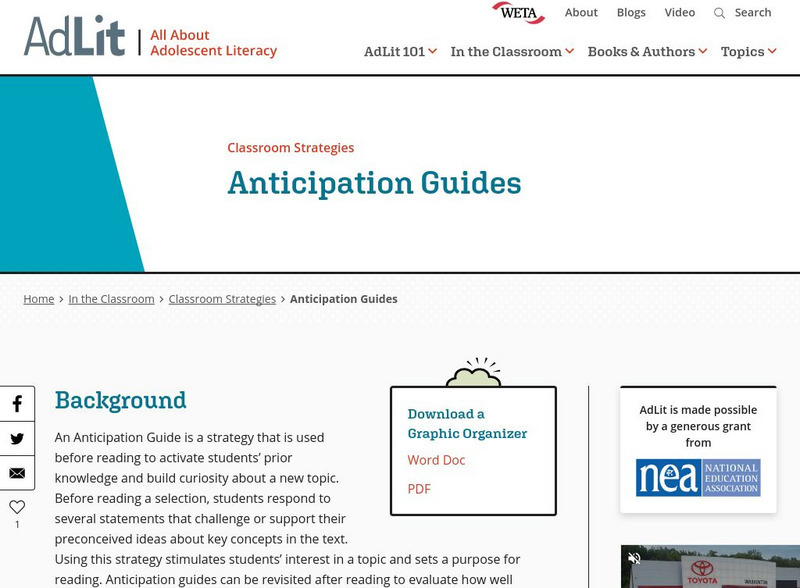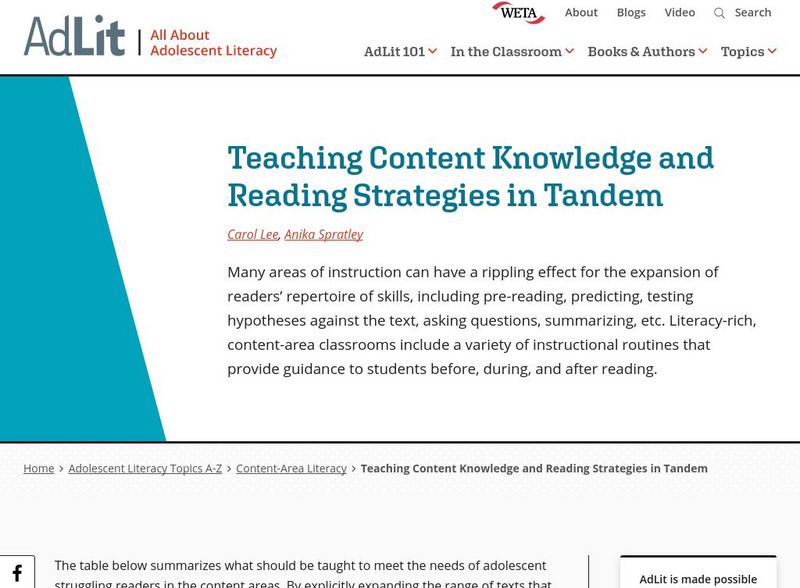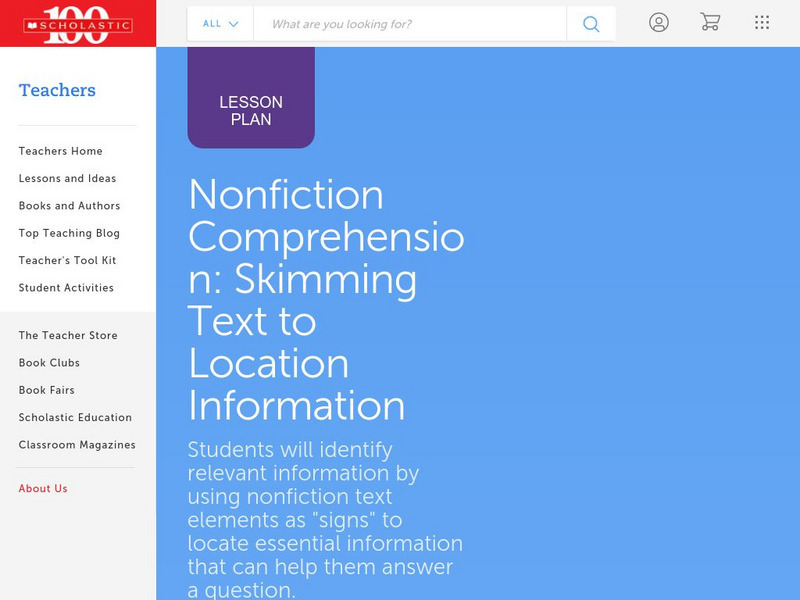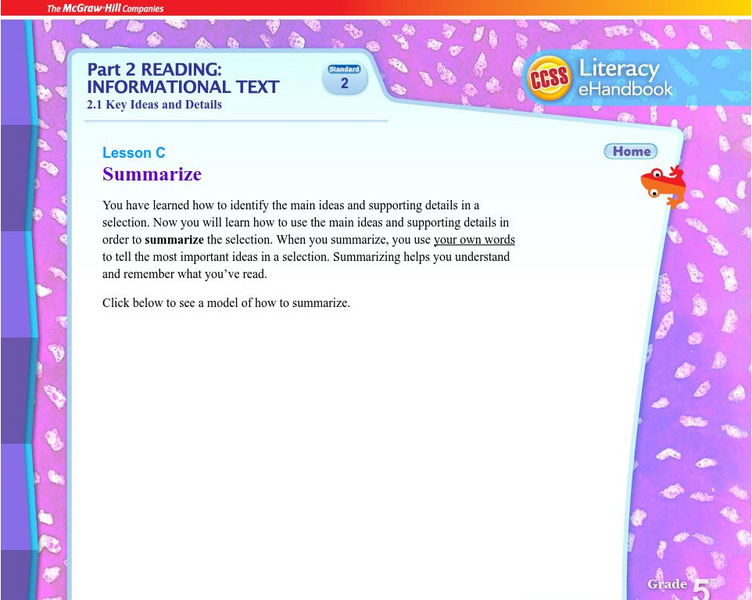Texas Education Agency
Texas Gateway: Analyze Texts With Similar/different Author's Purpose
[Accessible by TX Educators. Free Registration/Login Required] This lesson focuses on being able to identify the author's purpose in a specific text. Specifically, it's about looking at several authors' works on the same topic and...
Other
Carson Newman College: Close Reading of a Literary Passage [Pdf]
Provides a number of questions that students can ask themselves about a literary passage when doing a "Close Reading" and following this with an organized piece of writing. CCSS.ELA-Literacy.CCRA.R.5
Association for Supervision and Curriculum Development (ASCD)
Ascd: Building Literacy in Social Studies: Ch 1: Reading Social Studies Texts
Article provides excellent tips and strategies for building comprehension and critical thinking skills in Social Studies. It describes some of the challenges students have with reading and understanding their textbooks.
Better Lesson
Better Lesson: Analyzing Text Complexity of Non Fiction Sources
This lesson plan will help middle schoolers read and comprehend nonfiction, specifically biographies, through determining criteria for text complexity. Included is a PDF and Smart Notebook titled Determining Text Complexity, and an...
Better Lesson
Better Lesson: Collaborative Booktalk: Sharing and Writing Development
Are dark themes in young adult novels harmful or helpful to teens? Students will explore this question and will create an argumentative writing piece based on textual evidence. Videos of the lesson in action, examples of student work,...
Other
City College: Skills for Life: Reading for a Purpose
This resource offers 11 exercises with variety of everyday reading passages such as letters, recipes, classified ads, etc. Students read the passage and answer multiple choice questions about its purpose.
Texas Education Agency
Texas Gateway: Using Features of Literary & Informational Text to Guide Reading
A learning module that teaches students about using text features to guide reading in three mini lessons: Engaging with Text, Literary Think-Aloud, and Informational Think-Aloud. Download a PDF with lesson plans and printable handouts...
AdLit
Ad lit.org: Classroom Strategies: Anticipation Guides
An Anticipation Guide is a strategy that is used before reading to activate students' prior knowledge and build curiosity about a new topic. Before reading a selection, students respond to several statements that challenge or support...
AdLit
Ad lit.org: Key Literacy Component: Text Comprehension
Text comprehension allows readers to extract or construct meaning from the written word. Students who misread words or misinterpret their meanings are at a disadvantage. Proper instruction can boost students' skills in this key area.
AdLit
Ad lit.org: Teaching Content Knowledge and Reading Strategies in Tandem
Many areas of instruction can have a rippling effect for the expansion of readers' repertoire of skills, including pre-reading, predicting, testing hypotheses against the text, asking questions, summarizing, etc. Literacy-rich,...
Scholastic
Scholastic: Lesson Plan for Nonfiction Comprehension: Skimming Text
Build comprehension by developing reading strategies for use with nonfiction text. This lesson focuses on teaching students to recognize text elements as clues to help them quickly locate key information in text.
Writing Fix
Writing Fix: Emotions and Colorful Days
In this lesson students will learn to write descriptively.
E Reading Worksheets
E Reading Worksheets: Summarizing Worksheets and Activities
In this instructional resource, students will learn more about summarizing texts. Worksheets and PowerPoint lessons are provided to reinforce understanding about ways to summarize nonfiction texts and to identify main ideas. This module...
Wisconsin Response to Intervention Center
Wisconsin Rt I Center: Text Dependent Questions [Pdf]
Describes a reading strategy where students must respond to text by supporting their ideas with text-based evidence. Lists different categories of questions the teacher can prepare based on the text chosen, with examples for each.
Curated OER
Mc Graw Hill: Use Details and Examples
Review how to use text evidence, details, examples, and personal experiences to make inferences then read a passage to practice on your own.
Curated OER
Mc Graw Hill: Part 2 Reading: Determine Main Ideas and Supporting Details
See how to pick out the main ideas and supporting details on this site. Click on Model at the bottom right.
Curated OER
Mc Graw Hill: Part 2 Reading: Determine Main Ideas and Supporting Details
See an example of how to determine the main ideas and supporting details of a story.
Curated OER
Mc Graw Hill: Part 2 Reading: Informational Text: Summarize
Learn how to summarize a section of a text with this site.
Curated OER
Mc Graw Hill: Part 2 Reading: Informational Text: Evaluate Arguments and Claims
This article will help you evaluate informational text to determine whether an author's argument is supported by evidence or not. Click on Model to see a model with explanations and then click on Practice.
E Reading Worksheets
E Reading Worksheets: Author's Purpose Worksheets
In this learning module, students will learn more about author's purpose. Worksheets and PowerPoint lessons are provided to help students analyze authors' purposes more effectively. This module is designed to support Tier I, Tier II, and...
Grammarly
Grammarly Handbook: Patterns of Organization for Academic Texts
A list of six different ways to organize a text with links to more information for each.
Polk Brothers Foundation Center for Urban Education at DePaul University
De Paul University: Center for Urban Education: Read to Learn, Share What You Learn [Pdf]
Several tips for reading to learn are provided on this page. Students will explore the BIG idea presented in a nonfiction piece.
McGraw Hill
Mc Graw Hill: Informational Text: Analyze Development of Text Elements: Events
Read an informational piece, and learn how to analyze the development of an event in the text.
Curated OER
Mc Graw Hill: Identify Author's Point of View
Learn the techniques an author uses to share his or her point of view on a subject then practice identifying an author's purpose on your own.


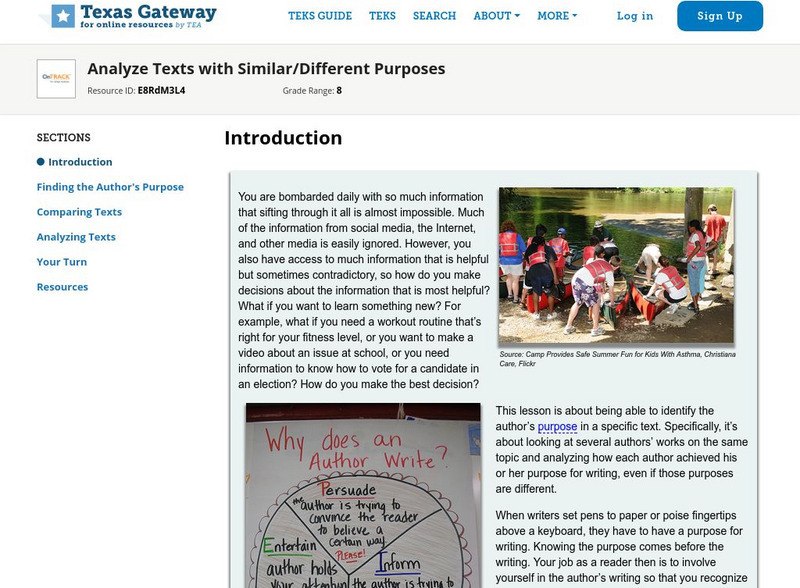
![Carson Newman College: Close Reading of a Literary Passage [Pdf] Unit Plan Carson Newman College: Close Reading of a Literary Passage [Pdf] Unit Plan](https://d15y2dacu3jp90.cloudfront.net/images/attachment_defaults/resource/large/FPO-knovation.png)

